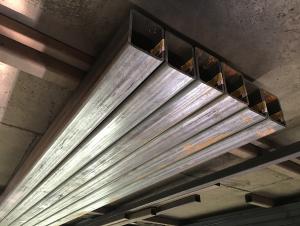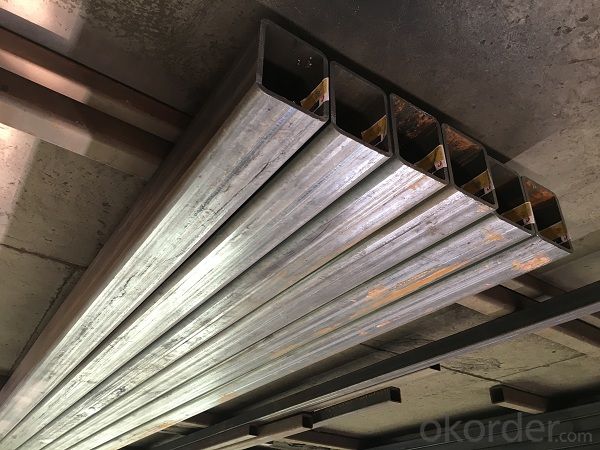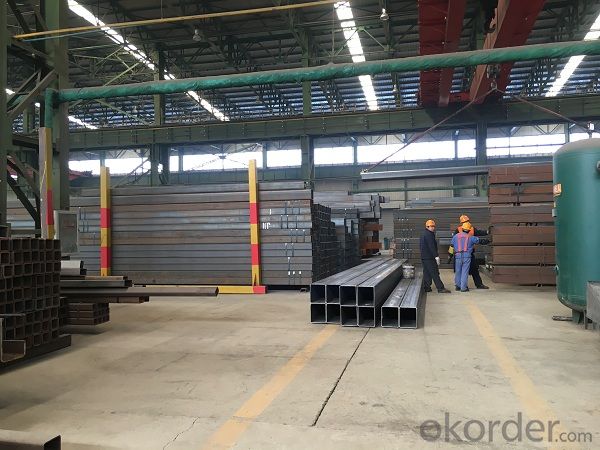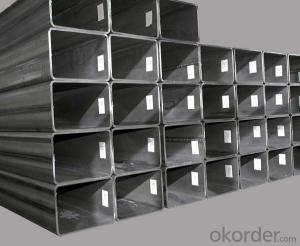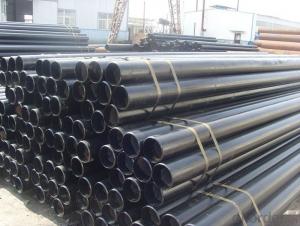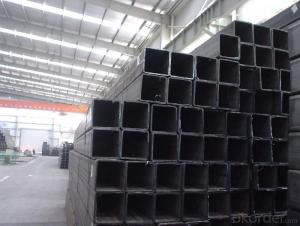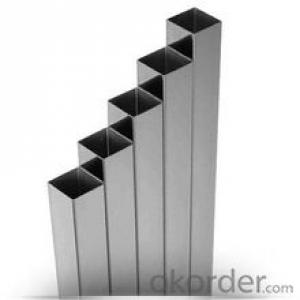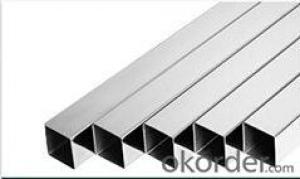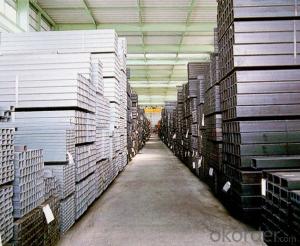Square Tubes Hollow Section for selling
- Loading Port:
- Tianjin
- Payment Terms:
- TT or LC
- Min Order Qty:
- 15 m.t.
- Supply Capability:
- 14500 m.t./month
OKorder Service Pledge
OKorder Financial Service
You Might Also Like
1、 Square Tubes Hollow Section for selling:
ERW steel pipe is electric resistance welding, the abbreviation for ERW for transporting oil and natural gas vapor liquid objects, can meet the requirements of high and low pressure, the transport in the world with pipe sector accounted for a pivotal position.
2、 Square Tubes Hollow Section for selling
• High manufacturing accuracy
• High strength
• Good visual effect
• Reasonable price
3、 Square Tubes Hollow Section for selling:
Standard | GB, DIN, ASTM ASTM A106-2006, ASTM A53-2007 |
Grade | 10#-45#, 16Mn 10#, 20#, 45#, 16Mn |
Thickness | 1 - 33 mm |
Section Shape | Round |
Outer Diameter | 21 - 610mm |
Place of Origin | Tianjin, China (Mainland) |
Secondary Or Not | Non-secondary |
Application | Hydraulic Pipe |
Technique | Cold Drawn |
Certification | API |
Surface Treatment | factory state or painted black |
Special Pipe | API Pipe |
Alloy Or Not | Non-alloy |
Length | 5-12M |
Outer Diameter | 21.3-610mm |
Grade | 20#, 45#, Q345, API J55, API K55, API L80, API N80, API P110, A53B |
Standard | ASME, ASTM |
1) Material:20#(ASTM A 106/A53 GRB.API5LGRB,GB),45#,16Mn,10#.
2) Specification range:OD:21.3-610mm,WT:6-70mm,length:6-12m or according to the requirement of clients.
3) Excutive standards:GB,ASME API5L.ASTM A 106/A53,Despite of the above standards,we can also supply seamless steel pipe with standard of DIN,JIS,and so on,and also develop new products according to the requirements of our clients!
4) Surface:black lacquered,varnish coating or galvanized.
5) Ends:Beveled or square cut,plastic capped,painted.
6) Packing:bundles wrapped with strong steel strip,seaworthy packing.
4、Packaging & Delivery
Packaging Details: | seaworthy package,bundles wrapped with strong steel strip |
Delivery Detail: | 15-30days after received 30%TT |
5、FAQ of Square Tubes Hollow Section for selling:
①How is the quality of your products?
Our products are manufactured strictly according to national and internaional standard, and we take a test
on every pipe before delivered out. If you want see our quality certifications and all kinds of testing report, please just ask us for it.
Guaranteed: If products’ quality don’t accord to discription as we give or the promise before you place order, we promise 100% refund.
②How about price?
Yes, we are factory and be able to give you lowest price below market one, and we have a policy that “ for saving time and absolutely honest business attitude, we quote as lowest as possible for any customer, and discount can be given according to quantity”,if you like bargain and factory price is not low enough as you think, just don’t waste your time.Please trust the quotation we would give you, it is professional one.
③Why should you chose us?
Chose happens because of quality, then price, We can give you both.Additionally, we can also offer professional products inquiry, products knowledge train(for agents), smooth goods delivery, exellent customer solution proposals.Our service formula: good quality+good price+good service=customer’s trust
SGS test is available, customer inspection before shipping is welcome, third party inspection is no problem.
6. Square Tubes Hollow Section for selling
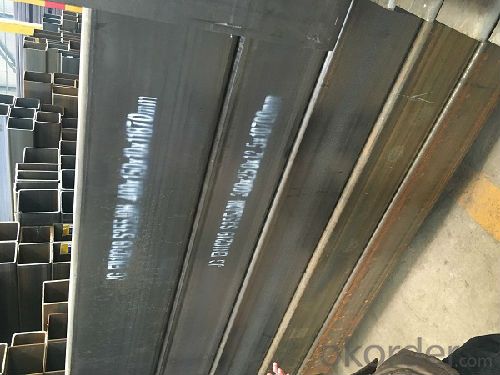
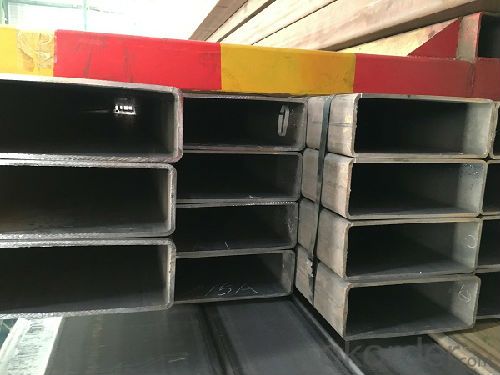
- Q: How do steel pipes handle extreme temperatures?
- Steel pipes can handle extreme temperatures due to their high strength and thermal stability. The properties of steel, such as its excellent heat resistance and low thermal expansion, allow it to withstand both high and low temperatures without significant deformation or structural damage. Additionally, the use of specialized coatings and insulation can further enhance the heat resistance of steel pipes, making them suitable for a wide range of applications in extreme temperature environments.
- Q: How are steel pipes used in petrochemical plants?
- Steel pipes are extensively used in petrochemical plants for various purposes such as transporting fluids and gases, as well as providing structural support. These pipes are commonly utilized for the safe and efficient transfer of crude oil, natural gas, and other chemicals within the plant. They are designed to withstand high pressure, extreme temperature conditions, and corrosive environments, ensuring the integrity and reliability of the plant's operations. Steel pipes also play a crucial role in the construction of process equipment, such as reactors, distillation columns, and heat exchangers, providing a durable and long-lasting solution for the petrochemical industry.
- Q: What is the difference between steel pipe and ductile iron pipe?
- The main difference between steel pipe and ductile iron pipe lies in their composition and properties. Steel pipe is made from a combination of iron and carbon, while ductile iron pipe is made from iron with added graphite and other elements to enhance its strength and ductility. Ductile iron pipe is typically stronger and more flexible than steel pipe, making it better suited for applications where durability and resistance to external forces are important. Additionally, ductile iron pipe is less susceptible to corrosion compared to steel pipe, making it a preferred choice in environments with high moisture or corrosive elements.
- Q: What are the advantages of using steel pipes in industrial plants?
- There are several advantages of using steel pipes in industrial plants. Firstly, steel pipes are known for their exceptional strength and durability. They can withstand high temperatures, pressure, and heavy loads, making them ideal for transporting various materials and fluids within industrial facilities. Secondly, steel pipes have excellent resistance to corrosion. This is particularly important in industrial settings where the pipes come into contact with corrosive substances or are exposed to harsh environmental conditions. The corrosion resistance of steel pipes ensures their longevity and helps to prevent leaks, which can be costly and hazardous. Additionally, steel pipes offer a high level of versatility. They can be easily fabricated and customized to meet specific requirements, such as different sizes and shapes. This flexibility allows for easier installation and maintenance, reducing downtime and improving overall efficiency in industrial plants. Moreover, steel pipes have a smooth interior surface, which offers several advantages. It allows for efficient flow of materials, minimizing resistance and pressure drop. This smoothness also makes steel pipes less prone to accumulating deposits and contaminants, ensuring a clean and hygienic environment. Furthermore, steel pipes are highly resistant to fire. In industrial plants, where fires can have catastrophic consequences, the fire resistance of steel pipes provides an added layer of safety. Lastly, steel pipes are cost-effective in the long run. Although their initial installation cost may be higher compared to other materials, such as plastic or copper, their durability and low maintenance requirements result in significant cost savings over time. Steel pipes have a long lifespan, reducing the need for frequent replacements or repairs, and their resistance to corrosion and other damages also contributes to cost reduction. In conclusion, the advantages of using steel pipes in industrial plants include their strength, durability, corrosion resistance, versatility, efficient flow, fire resistance, and cost-effectiveness. These qualities make steel pipes a reliable and efficient choice for various applications within industrial facilities.
- Q: How are steel pipes used in the telecommunications infrastructure?
- Steel pipes are used in the telecommunications infrastructure for various purposes such as underground cable installation, mounting antennas, and supporting communication towers. They provide durability, strength, and protection for the cables and equipment, ensuring reliable and efficient communication networks.
- Q: Are steel pipes suitable for underground gas distribution?
- Steel pipes are indeed appropriate for the distribution of gas underground. Due to their remarkable strength, durability, and resistance to corrosion, steel pipes are extensively employed in gas distribution systems. The ability of steel pipes to endure the pressure and stress in underground environments renders them a dependable choice for gas transportation. Moreover, steel pipes possess the added benefit of being capable of withstanding high temperatures and resisting fire, making them a secure alternative for underground gas distribution. Nonetheless, it is crucial to ensure that the steel pipes employed are adequately coated and shielded against corrosion to guarantee their longevity and avert any possible leaks or harm.
- Q: What are the common standards for steel pipe manufacturing?
- There are several common standards for steel pipe manufacturing that ensure the quality and consistency of the products. One of the most widely recognized standards is the American Society for Testing and Materials (ASTM) standard, which includes various specifications for different types of steel pipes. These specifications cover dimensions, mechanical properties, and testing requirements. Another common standard is the American National Standards Institute (ANSI) standard, which establishes guidelines for the manufacturing process, material requirements, and performance characteristics of steel pipes. ANSI standards are often used in industrial applications and construction projects. In addition to these, there are international standards such as the International Organization for Standardization (ISO) standard, which provides guidelines for the design, production, and testing of steel pipes. The ISO standard ensures that steel pipes meet global quality and safety standards. Furthermore, specific industries may have their own standards for steel pipe manufacturing. For example, the American Petroleum Institute (API) has developed standards specifically for oil and gas industry applications. These standards, such as API 5L, outline requirements for the manufacturing, testing, and inspection of steel pipes used in the transportation of oil and gas. Overall, these common standards for steel pipe manufacturing help to ensure the quality, reliability, and safety of the products. They provide a standardized framework that manufacturers can follow, enabling customers to have confidence in the performance and durability of the steel pipes they purchase.
- Q: Can steel pipes be used for underground sewage treatment plants?
- Indeed, underground sewage treatment plants can utilize steel pipes. These pipes are frequently employed in underground settings due to their ability to endure, their strength, and their resistance to corrosion. They can withstand the harsh conditions found underground and effectively transport sewage within the treatment facility. Furthermore, steel pipes can be tailored to meet the specific needs of the sewage treatment plant, including varying diameters and wall thicknesses to ensure proper flow and drainage. Additionally, these pipes can be coated or lined with protective materials, enhancing their resistance to corrosion and prolonging their lifespan. All in all, steel pipes are a dependable and suitable option for underground sewage treatment plants.
- Q: How are steel pipes used in the construction of solar power plants?
- Steel pipes are used in the construction of solar power plants for various purposes, including the installation of solar panels, mounting structures, and the transportation of fluids such as water and steam within the plant. These pipes provide strength, durability, and corrosion resistance, making them an essential component in the construction and operation of solar power plants.
- Q: What are the advantages of using stainless steel pipes?
- There are several advantages of using stainless steel pipes. Firstly, stainless steel pipes have excellent corrosion resistance, making them suitable for a wide range of applications, including industrial, commercial, and residential plumbing systems. They can withstand harsh environments, chemicals, and high temperatures without deteriorating or rusting. Secondly, stainless steel pipes have high strength and durability, ensuring long-term reliability and reducing the need for frequent repairs or replacements. They can handle high pressure and stress, making them suitable for transporting fluids and gases in various industries. Additionally, stainless steel pipes are hygienic and easy to clean, making them ideal for applications in the food, beverage, and pharmaceutical industries. They are resistant to bacterial growth and contamination, ensuring the integrity and safety of the transported materials. Furthermore, stainless steel pipes are aesthetically pleasing and can be easily customized to fit different design requirements. They offer a sleek and modern appearance, making them suitable for architectural and decorative purposes. Overall, the advantages of using stainless steel pipes include corrosion resistance, durability, strength, hygiene, and aesthetic appeal, making them a reliable and versatile choice for various industries and applications.
Send your message to us
Square Tubes Hollow Section for selling
- Loading Port:
- Tianjin
- Payment Terms:
- TT or LC
- Min Order Qty:
- 15 m.t.
- Supply Capability:
- 14500 m.t./month
OKorder Service Pledge
OKorder Financial Service
Similar products
Hot products
Hot Searches
Related keywords
